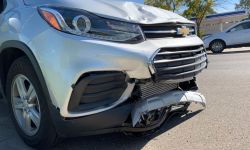Opinion | Tweak no-fault reform to help seriously injured Michiganders
It could be a busy morning like any other. You’re rushing to get the kids off to school before getting behind the wheel and heading in to work. Except this time, as you’re navigating highway traffic, the guy next to you is so busy posting on social media that he suddenly slams into you, crushing your vehicle against the guardrail. Your car is totaled and you wake up in the hospital with life-changing, catastrophic injuries.
Now what?

Although this scenario may sound like a nightmare that could never happen to you, it’s unfortunately all too common. According to a statewide voter survey done in 2018, the majority of Michiganders have either been seriously injured in an auto accident or know someone who has.
Before legislation reforming no-fault auto insurance was passed in 2019, people in accidents like the hypothetical one I described could focus on post-accident rehabilitation, knowing the specialized care and services they needed to lead a dignified, independent life were covered.
However, those patients are now in jeopardy of being victimized again – this time by an unintended consequence of the 2019 insurance reforms.
On July 1, 2021, a new fee schedule will go into effect that slashes reimbursements for many specialized treatments and services by nearly half. This will be devastating for catastrophically injured auto accident victims and the highly trained providers who care for them. This cap on reimbursements also applies to family members who care for patients stable enough to remain at home.
Victims of horrific accidents often have unique needs that may require intensive treatment and services to return them to employment and their normal course of life; others may require specialized care around the clock in order to remain safe, healthy, and productive. Needless to say, these patients will be thrown into chaos if their access to care abruptly comes to an end.
But it’s not just the thousands of accident victims and their families who will pay the price after July 1. When we recently surveyed brain injury providers, nine out of 10 said they had little to no confidence that they would be able to remain in business past July. Nearly 5,000 Michigan jobs are on the line—many in rural areas—in an already shaky pandemic economy.
The good news? A narrow and technical fix is available. And contrary to insurance industry scare tactics, it does not rewrite the entire fee schedule, add costs to the system, or change any other element of no-fault auto reform.
House Bill 4486 and Senate Bill 314, introduced by State Rep. Doug Wozniak and State Sen. Curtis Hertel, Jr., respectively, would enable continued access to care without sacrificing cost controls. The bills are supported by small businesses, the Christopher and Dana Reeve Foundation, the Michigan Assisted Living Association, and others.
In the 2018 statewide survey, nearly two-thirds of voters said we have a responsibility to continue our long-honored promise to provide care for auto accident victims with catastrophic injuries. That promise is now in jeopardy.
This proposed solution won’t solve all problems for everyone over the coming months, but it is an easy, non-controversial resolution to a looming crisis. Michigan’s catastrophic auto accident victims who require care, not to mention a majority of Michigan voters, are relying on the Legislature to make this right.
See what new members are saying about why they donated to Bridge Michigan:
- “In order for this information to be accurate and unbiased it must be underwritten by its readers, not by special interests.” - Larry S.
- “Not many other media sources report on the topics Bridge does.” - Susan B.
- “Your journalism is outstanding and rare these days.” - Mark S.
If you want to ensure the future of nonpartisan, nonprofit Michigan journalism, please become a member today. You, too, will be asked why you donated and maybe we'll feature your quote next time!




